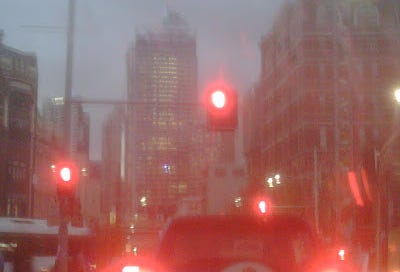*
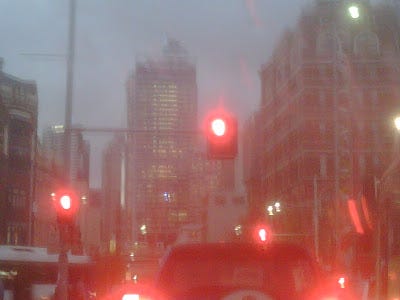
Nothing Perry ever did worked. Except when he wanted to hurt someone. To kill someone. That worked every time.
What the f... was Dew's problem, anyway? Pretending to get all pissed aboutthe family. Why didn't Dew and the others understand? Those people weren't human anymore. They wre weak. They didn't have discipline. That meant they needed to die. If one of them, any of them, was even trying to cout out the triangles, then Perry would let them live. Maybe. But it didn't matter, because so far no one had fought.
No one but him.
Why? Why was he special? He knew why: because his drunken, fucked-up wife - and child beating father had toughend him up with a strap.
Perry set the beer bottle on the bed to the right side of his face. He tipped it - this time more made it into his mouth than onto the bed. His face was all wet and sticky.
He didn't feel a thing for the infected. Not a thing. That freakin' toddler had rushed him, for crying out loud. They weren't just infected, they were stupid.
That was the last thought to go through Perry's mind before he passed out for the second time that night.
Scott Sigler, Contagion.
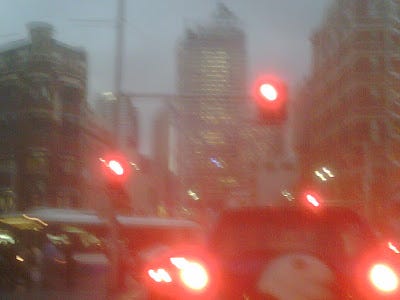
Did they ever suspect that evil was in their midst? Why did everything begin with, I will never forget, when in fact it was obvious whole sheets of memory were breaking away, disappearing, that nothing would ever be the same again, that the time for happiness had finally arrived. He had been so very, very miserable the mere contemplation of his states of mind brought tears and shock, the liquid glue, the thick atmosphere in which he had survived poisoning every move. He had been living at the bottom of a lead aquarium, it was the only way he could think to describe it, squashed flat by the weight of the heavy liquid metal above him, that poisonous silver, that utterly disturbed, indeed anguished state of mind.
“I’ve never known anyone so perpetually miserable,” someone said, and he couldn’t argue, squashed flat like Elliot’s ancient claws on the bottom of an ancient sea. That was why the brief memories of the good times became so valuable. The days when they were brave enough to hitch hike across Morocco, and never thought of jihad, that someone might want them dead. Be kind to the traveller, courteous to the stranger, the Prophet Mohammed had said, and in his experience the Muslims amongst which he travelled had always taken it seriously. They had been to so many places together, he and Martin, their pioneering relationship, the days when gay couples were not de rigeur and Oxford Street wasn’t full of clones.
The days before political correctness mandated tolerance and acceptance was a life time away. There were the snow capped mountains in the distance, across the wide flat plain, when the truck driver dropped them at Sofia and they found themselves walking down the road with the desert on one side and the most luxuriant, meticulously maintained oasis lay on their left. It was late afternoon, nearing four pm, the time when all his instincts always told him it was time to find shelter for the night. They couldn’t see a village, just the farms, and there was no convenient, cheap, ramshackle hotel. So he plunged into the oasis, walking along the well maintained paths, the trickling waters, the perfect squares where vegetables and crops were grown in between the date palms. It really was a Garden of Eden.
Ostensibly he was looking for cigarettes. But soon he came across a local, a foreigner in their fields, and the daughter of the family, who was educated, and acted as a translator. He took her, along with her brothers, these people were never alone, back to the road, to where Martin stood guarding the bags, looking very out of place, a toffee nosed private school boy from Adelaide. Oh how good looking he was, even now in the heat and the dust. His heart always sank. He had found everything he wanted, back there, the best departure possible from the King Cross streets, from the dereliction in which his life had begun to sink. He was only 25, but he had been drinking heavily for a decade, since he first began passing out in the streets at 15, and athere was nothing young or naïve about his presence.
Be kind to the traveller courteous to the stranger was taken literally in those days, before they started killing us, and they were dragged willingly enough back to the family compound, offered a bed for the night in a high off the ground house which formed part of the tiny settlement. It was a perfect farm surrounded by a perfect oasis, and he could see the snow dusted peaks beyond the palms. One of the younger brothers was dispatched for cigarettes. He was introduced with great ceremony to the parents, and to the patriarch, a tough, tiny little man entirely responsible for the immaculate condition of the surrounding fields. An elaborate evening meal was prepared, and they were treated with great hospitality, there amongst the dirt of the compounds, on a random farm only fate had led them to.
He was just finishing reading Fringe of Leaves by Patrick White, from memory a rather obscure, elegaic, full blown piece, and when they left the following morning he left it with the girl, who was preparing to go off to Casablanca, to university, a subject of great consternation amongst the family. He always wondered what happened to that book, was it passed down from person to person, a rare object, a rare opportunity to practice their English. What on earth would they have made of it, these proud Moroccan villagers? Did meeting them change her life, encourage her to break out from the strictures of the traditional life? Bring into their peaceful world the ferment of the 60s in the West?
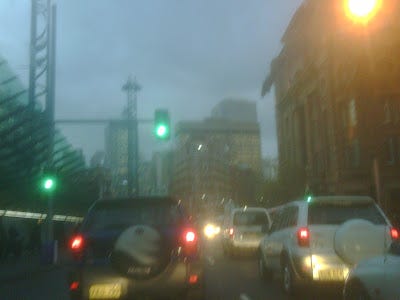
THE BIGGER STORY:
http://www.smh.com.au/environment/global-warming/climate-comment-rains-on-rudds-victory-parade-20090710-dg23.html
THE US President, Barack Obama, has urged world leaders to banish their pessimism about thrashing out a climate-change deal with developing countries, heralding a new era for the US and citing Australia's carbon capture project for plaudits.
However, just hours later Mr Rudd was overheard pouring cold water on the prospects for a deal at the Copenhagen talks in December.
"Right now I don't think we are on track to get an agreement at Copenhagen," Mr Rudd told the Danish Prime Minister, Lars Lokke Rasmussen.
His comments were picked up by TV microphones.
Before Mr Rudd's comment Mr Obama had taken centre centre stage after a meeting of the 17-member Major Economies Forum. The US President provided a detailed brief on the very limited agreements reached on climate change. For some good news he had turned the public spotlight onto Mr Rudd and Australia's push into new technologies.
Flanked by other world leaders, Mr Obama quipped to Mr Rudd "you got us back up here", prompting the Prime Minister to look at his international counterparts and say, "It's good we hunt in packs."
Before his comment to Mr Rasmussen Mr Rudd had told the news conference that Australia's $100 million-a-year Carbon Capture and Storage Institute now had global backing and would be led and advised by world experts, including the British economist Nicholas Stern.
He said carbon capture and storage, which captures carbon dioxide and injects it deep underground, is an important weapon in the battle against global warming. He said the institute, launched nationally last month, would now act as a global clearing house to streamline research, funding and legislation to encourage the new technologies worldwide.
http://www.theaustralian.news.com.au/story/0,25197,25725753-5013871,00.html
KEVIN Rudd has called for a public debate on journalistic ethics, rounding on several News Limited publications over reporting of the OzCar affair.
The Prime Minister has also criticised The Australian, published by News Limited, accusing it of conducting a vendetta against Deputy Prime Minister Julia Gillard because she complained about the accuracy of its reporting of his government's spending program on schools.
Last month, Mr Rudd faced opposition calls that he resign after public servant Godwin Grech said he remembered having seen an email from Mr Rudd's office ordering him to give assistance to car dealer John Grant, who gives Mr Rudd free use of a utility vehicle for campaigning in his Brisbane electorate.
Mr Grant was seeking help through the government's $2billion OzCar fund, established to help car dealers survive the credit crunch caused by the global recession.
While Mr Grech said he did not have a copy of the email, three News Limited publications -- Sydney's The Daily Telegraph, Adelaide's The Advertiser and Brisbane's The Courier-Mail -- ran reports about the existence of an email. It later transpired that the email was a forgery.
At a news conference in Darwin yesterday, The Australian asked Mr Rudd why he needed a free ute considering taxpayers already funded a vehicle for MPs.
Mr Rudd said he had declared the vehicle on his pecuniary interest register, and he launched an attack on the newspapers, saying they had accused him of corruption without their editor having seen a copy of the purported email.
"I would have thought a few people would want to know how all of that happened -- what sort of journalistic checks were put in place," Mr Rudd said.
"Or is this simply being airbrushed from history?"
http://www.theaustralian.news.com.au/story/0,25197,25725994-2702,00.html
KEVIN Rudd may have failed to emulate Bob Hawke's "love affair with the Australian people", but his honeymoon with much of the media shows no sign of losing its ardour after 18 months in office.
Rudd's triumph has been to water down a ruthless political will with a warm-and-cuddly persona that has been sold to the public on media platforms that were regarded as beneath his predecessor, John Howard.
Members of Team Howard, including the former prime minister, have been shaking their heads at Rudd's extraordinary exertions of spin and the tolerance of the Canberra press gallery towards the exercise.
Those more sympathetic to Rudd, such as former Labor pollster Rod Cameron, believe the Prime Minister's smooth ride has come courtesy of discipline and good management, plus the disarray among the Coalition.
Cameron sees Rudd's strategy of working the talk shows as a logical extension of Howardism. "Howard broke the mould by ignoring highbrow media and going to commercial talkback, and Rudd has just taken it a step further and gone to somewhat trashier radio and television," Cameron said.
The recent Rudd spin cycle involved the studied alternation between bloodthirsty displays in parliament over the OzCar affair and soft media appearances, such as last Sunday's effort on Rove, which included a photo-shoot with Sacha Baron Cohen's alter ego, Austrian fashionista Bruno.
Senior Liberal frontbencher Tony Abbott said yesterday it was not hard to tell who was the funnier - Rudd or Bruno - but added that it was harder to say who was the more "phoney".
While Rudd was attacking News Limited newspapers yesterday about their coverage of the OzCar affair and wastage in the government's $14.7 billion Building the Education Revolution program, he was following through on his on-air promise to TV host Rove McManus to send a Twitter with the line "It's Twitter time", which prompted McManus to reply: "You rule! (and not just because you are our elected leader)."
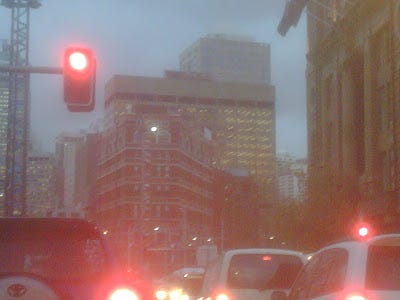
Sydney traffic, winter mist.

